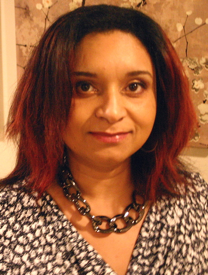Expert Help for OCD
Take Your Life Back from OCD
Offering expert treatment for all types of OCD, including unwanted obsessional thoughts. Our OCD treatment program is typically 10 weeks. We offer twice-weekly sessions, groups, and intensive programs. Intensive program can be in person or online. Low cost options available. Contact us...
Behavioral Wellness Clinic
392 Merrow Rd, Suite E,
Tolland, CT 06084
Office: (860) 830-7838
New England
OCD Institute
Monnica Williams, PhD, ABPP

Clinical Director
Monnica T. Williams, Ph.D., is the director of the New England Institute, and the Behavioral Wellness Clinic in Tolland, Connecticut. She is also the former Director and founder of the Louisville OCD Clinic and the Behavioral Wellness Clinics in Kentucky, Pennsylvania, and Virginia. She is affiliated with the University of Ottawa, where Dr. Williams is an Associate Professor in the School of Psychology. She is licensed as a psychologist in Pennsylvania, Connecticut, Virginia, and Ontario. She also has an Interjurisdictional Practice Certificate (IPC), as well as a temporary license in Texas and Illinois. She specializes in the treatment of OCD for people with unwanted sexual obsessions, including (HOCD or SO-OCD), and has a book on this topic published by Oxford University Press, the first of its kind for the treatment of sexual obsessions. She also published the first ever peer-reviewed journal articles on SO-OCD and P-OCD. She does however treat all forms of OCD.
Dr. Williams has been an Assistant Professor at the Center for the Treatment and Study of Anxiety in Philadelphia, at the University of Pennsylvania School of Medicine, where she trained under OCD and PTSD luminary Dr. Edna Foa for four years. She went to MIT for her undergraduate studies, completing a BS in electrical engineering. She then went to UCLA for for additional studies. She then received Master's and Doctoral Degrees in Clinical Psychology from the University of Virginia, where she conducted research in the areas of major mental illness, ethnic differences in contamination anxiety and psychometrics. She then trained at McGill University where she completed her clinical internship at Health Centre, Montreal General Hospital Site.
Dr. Williams has numerous publications, including chapters in edited volumes, books, and scientific articles. She is on the Scientific Advisory Board of the International OCD Foundation, and has served on the board of directors for the National Alliance on Mental Illness (NAMI) Louisville, the OC Foundation of California, and NAMI Philadelphia Main Line chapter.
Dr. Williams also provides training and supervision for therapists in the assessment and treatment of OCD and other conditions. She also treats other medical professionals.

Dr. Williams is co-chair of the International OCD Foundation's Diversity Council. She is in the center, surrounded by distinguished colleagues at the annual convention in San Francisco in June 2017.
To contact Dr. Williams directly by email or for directions to her office at the University of Ottawa, visit her contact page.
Selected Books
Williams, M. T. & Wetterneck, C. T. (2019). Sexual Obsessions in Obsessive-Compulsive Disorder: A definitive step-by-step guide for understanding, diagnosing, and effectively treating OCD. Oxford University Press.
Selected Publications
Obsessive-Compulsive Disorder
Williams, M. T., Ching, T. H. W., Tellawi, G., Siev, J., Dowell, J., Schlaudt, V., Slimowicz, J., & Wetterneck, C. T. (2018). Assessing sexual orientation symptoms in obsessive-compulsive disorder: Development and validation of the Sexual Orientation Obsessions and Reactions Test (SORT). Behavior Therapy, 49 (5), 715-729.
Ching, T. H. W. & Williams, M. T. (2018). Association Splitting of the Sexual Orientation-OCD-Relevant Semantic Network. Cognitive Behaviour Therapy, 47 (3), 229-245.
Bruce, S. L., Ching, T., & Williams, M. T. (2018). Pedophilia-themed obsessive compulsive disorder: Assessment, differential diagnosis, and treatment with exposure and response prevention. Archives of Sexual Behavior, 47(2), 389-402.
Williams, M. T., Taylor, R., Chatters, L. M., & Himle, J. (2017). Demographic and health-related correlates of obsessive-compulsive symptoms among African Americans. Journal of Obsessive Compulsive and Related Disorders, 14, 119-126.
Wetterneck, C. T., Williams, M. T., Tellawi, G., & Bruce, S. (2016). Treatment of suicide obsessions in obsessive-compulsive disorder with comorbid major depressive disorder. In E. Storch & A. Lewin (Eds.), Clinical Handbook of Obsessive-Compulsive and Related Disorders: A Case-Based Approach to Treating Pediatric and Adult Populations (pp. 431-445). Springer.
Williams, M. T., Wetterneck, C., Tellawi, G., & Duque, G. (2015). Domains of distress among people with sexual orientation obsessions. Archives of Sexual Behavior, 14 (3), 783-789. doi: 10.1007/s10508-014-0421-0
Williams, M. T., Farris, S. G., Turkheimer, E., Franklin, M. E., Simpson, H. B., Liebowitz, M., & Foa, E. B. (2014). The Impact of Symptom Dimensions on Outcomes for Exposure and Ritual Prevention Therapy for Obsessive-Compulsive Disorder. Journal of Anxiety Disorders, 28 (6), 553-558. doi: 10.1016/j.janxdis.2014.06.001
OCD Related Disorders
Williams, M. T., Sawyer, B., Ellsworth, M., Singh, R., & Tellawi, G. (2017). Obsessive-compulsive and related disorders in ethnoracial minorities: Attitudes, stigma, and barriers to treatment. In J. Abramowitz, D. McKay, & E. Storch (Eds.), The Wiley Handbook of Obsessive-Compulsive Related Disorders, (p. 847-872). Wiley. ISBN: 978-1-118-88964-0
Williams, M. T., & Viscusi, J. A. (2016). Hoarding disorder and a systematic review of treatment with cognitive behavioral therapy. Cognitive Behaviour Therapy, 45(2), 93-110. doi: 10.1080/16506073.2015.1133697
Singh, R., Wetterneck, C. T., Williams, M. T., & Knott, L. E. (2016). The role of shame and symptom severity on quality of life in obsessive-compulsive and related disorders. Journal of Obsessive Compulsive and Related Disorders, 11, 49-55.
Glazier, K., Wetterneck, C. T., Singh, S., & Williams, M. T. (2015). Stigma and shame as barriers to treatment in obsessive-compulsive and related disorders. Journal of Depression and Anxiety, 4(3), 191.

